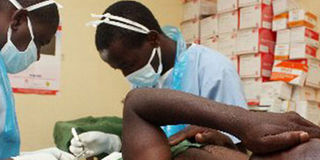Male circumcision lowers risk of HIV, study reveals

Voluntary male circumcision session. New study has revealed that circumcision “reduces the risk of HIV infection by about 60 per cent”. PHOTO | FILE | NATION MEDIA GROUP
What you need to know:
- The research added that circumcision “reduces the risk of HIV infection by about 60 per cent”.
- According to the 2014 Kenya Demographic Health Survey, men from Nyanza are less likely to be circumcised (72 per cent).
- Counties with the lowest percentage of circumcised men include Turkana (26 per cent), Siaya (56 per cent), Homa Bay (56 per cent) and Kisumu (59 per cent).
Male circumcision reduces the colonies of bacteria found on the penis which increase the risk of contracting HIV, a new study has shown.
The study, presented at the Conference on Retroviruses and Opportunistic Infections last month, showed that uncircumcised men have more bacteria in the genital region, which lead to inflammation.
The research added that circumcision “reduces the risk of HIV infection by about 60 per cent”.
In a series published in the Nation in March 2016, many men in non-circumcising communities targeted by the Health ministry said they were not aware of this health benefit.
Others said they thought they were safe as long as the women they slept with were not more than 60 in number.
According to the 2014 Kenya Demographic Health Survey, men from Nyanza are less likely to be circumcised (72 per cent).
Counties with the lowest percentage of circumcised men include Turkana (26 per cent), Siaya (56 per cent), Homa Bay (56 per cent) and Kisumu (59 per cent).
VOLUNTARY MALE CIRCUMCISION
Kenya implemented the voluntary male circumcision for HIV prevention programme after studies showed that non- circumcising regions such as Nyanza, Turkana, Teso and West Pokot had the highest prevalence of HIV.
Rolled out immediately after the presidential elections where opposition leader Raila Odinga lost, many people in Nyanza said they thought the programme was a plot to subdue the Luo community.
It was not until the Odinga family, notably Oburu Odinga, endorsed the cut that many people in the region accepted the programme.
By 2015, more than 860,000 men aged 15 to 49 had been circumcised, according to a 2016 UNAids report.





